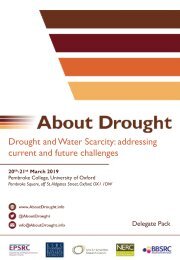About Drought Handbook: Outputs & Impacts
As the UK’s £12m Drought and Water Scarcity (DWS) research programme reaches its conclusion with a final event at The Royal Society in London, this handbook draws together the key outputs and outcomes. The book also features a series of interviews with our leading stakeholders, which highlight how successfully we have met our objectives to produce cutting-edge science that has made a demonstrable impact on how decision-makers manage water scarcity in the UK.
As the UK’s £12m Drought and Water Scarcity (DWS) research programme reaches its conclusion with a final event at The Royal Society in London, this handbook draws together the key outputs and outcomes. The book also features a series of interviews with our leading stakeholders, which highlight how successfully we have met our objectives to produce cutting-edge science that has made a demonstrable impact on how decision-makers manage water scarcity in the UK.
- No tags were found...
You also want an ePaper? Increase the reach of your titles
YUMPU automatically turns print PDFs into web optimized ePapers that Google loves.
Credit: Karl McCarthy<br />
mean for our natural resources including land, water<br />
and forestry? It can be easy to get overwhelmed by all<br />
the evidence.<br />
“During 2018’s prolonged hot dry weather we found<br />
the <strong>Drought</strong> Portal and the monthly Hydrological<br />
Outlooks useful, for example, for collating the Standard<br />
Precipitation Index triggers.”<br />
Being able to sit in a series of workshops around the<br />
same table as <strong>About</strong> <strong>Drought</strong>’s leading experts behind<br />
the data sets, has been invaluable for Tracey and for the<br />
programme team as well.<br />
“I WAS ABLE TO EXPLAIN TO THE<br />
RESEARCHERS THAT WHAT WORKS<br />
FOR ENGLAND ISN’T NECESSARILY<br />
RIGHT FOR WALES. DROUGHT<br />
PLANNING ISN’T THE SAME, SOME<br />
OF THE POLICY AND GOVERNANCES<br />
ARE QUITE DIFFERENT”<br />
“I am concerned about losing contact with everyone<br />
now the programme has ended. Will I have ability to still<br />
contact people if we don’t understand something or we<br />
want a bit more background?<br />
“The briefing papers and one-pagers on topics have<br />
been very useful but I need to think ‘How is that useful<br />
for Wales? What are the most likely drought impacts?<br />
Where will they be? What are the short, medium or<br />
long-term impacts?’ As an organisation we in NRW<br />
need to take that forward.<br />
“It would be good to have it packaged up for Welsh<br />
policy, a synopsis of how drought affects Wales rather<br />
than topic by topic. In terms of decision-making we are<br />
re-visiting how we ‘do’ drought in Wales and we are<br />
going to find the <strong>About</strong> <strong>Drought</strong> datasets useful now<br />
that we are evolving our drought policy.”<br />
Interview by Sally Stevens<br />
Tracey says: “It’s been beneficial both ways, not only<br />
did I get to know about so many things – including<br />
the drought communications work – but I was able<br />
to explain to the researchers that what works for<br />
England isn’t always necessarily right for Wales. <strong>Drought</strong><br />
planning isn’t always the same, some of the policy and<br />
governances are quite different.<br />
39




